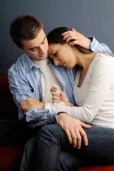Bible Stories for Young Adults



Deborah - Is Patriarchy the Best for Society?

What's so bad about patriarchy?
"[The prophet] will turn the hearts of the fathers to their children, and
the hearts of the children to their fathers; or else I will come and strike
the land with a curse." Malachi 4:6
After the Israelites were led out of Egyptian slavery and through the
wilderness under Moses, some 1400 years before Christ, they conquered the
promised land under the leadership of Joshua. As they settled in their new
homes, they looked to God-appointed judges to lead them. Under these
judges, the Israelites fell into a historical cycle of sinning, being judged
by God through oppressive or heathenish rule, repenting of sin, and
experiencing deliverance.
After Judge Shamgar died, the Israelites once again did evil in God's sight,
so he allowed the Canaanite King Jabin to oppress them. The commander of
Jabin's army was Sisera who had nine hundred iron chariots and he dealt
cruelly with the Israelites for twenty years. The Canaanite raids into
Israel were so frequent that the roads of Israel were abandoned, and people
had to travel on out-of-the-way twisting paths. People could no longer live
in villages, but had to remain in walled cities for safety. But even then,
war came to the gates of the walled city.
The Israelites had no defense -- not even a spear or shield. The people
cried out to the Lord. At this point, God gave them a woman to be Israel's
leader and judge, though Isaiah 3:12 speaks of women ruling as a sign of
judgement upon a people.
Often feminists who call themselves Christian point to Deborah as their
"heroine," their example of God's choice of a woman to lead and rule over
men. But let us see what Deborah's own stance is on the issue of
patriarchy.
Deborah, as a prophetess, received direction from the Lord concerning
Sisera. She sent for Barak and told him to gather ten thousand men from the
Israelite tribes and go to Mount Tabor. She told Barak that the Lord would
lure Sisera with his chariots and his troops to the Kishon River valley
where Sisera's army would be defeated.
Barak replied to Deborah, "If you go with me, I will go; but if you don't
go with me, I won't go." Barak seemed either unsure of Deborah's prophecy,
or unsure of the Lord's being with him to have asked Deborah, a woman, to go
to the battlefield with him.
Deborah was not pleased with this overturning of the patriarchal order.
She said, "Very well. I will go with you, but because of the way you are
going about this, the honor will not be yours, for the Lord will hand Sisera
over to a woman." This was a rebuke to Barak. It was a crush to male ego
that a woman should win the honor for a battle won. Deborah did not believe
that women should take on the roles that God had assigned for men, or else
she would not have chided Barak in this way.
Barak, his ten thousand men, and Deborah all went to the battle. Heber, a
man who dwelt in the land but who had sat on the political fence, trying to
be friends with both the Canaanites and the Israelites, informed Sisera that
Israel had gathered ten thousand troops on Mount Tabor. So General Sisera
gathered his nine hundred iron chariots and his men to the Kishon River.
Once the Canaanite army was in the valley, Deborah shouted, "Go! Today the
Lord has given Sisera into your hands. The Lord has gone ahead of you."
So as Barak advanced, the Lord intervened by sending a flash flood which
caused the nine hundred iron chariots of Sisera's army to mire down in the
mud of the swelling Kishon River bed.. All of Sisera's troops were killed
by the sword as the Lord intervened. But Sisera abandoned his chariot and
fled on foot.
The battle is never truly won until the top guy is put to death, and the
real hero of a battle is the one who takes the life of that man. Sisera
knew he would be the prime target, so he fled to Heber's tent -- the same
Heber that had warned him about Barak's ten thousand. Heber's wife, Jael,
who evidently was quite aware of the nearby battle, went out to meet Sisera
and invited him into her tent. She seemed quite friendly, admonishing him
to not be afraid, giving him milk to drink, and a covering. As he lay down,
he told Jael to stand in the doorway of the tent and deny that anyone is in
the tent should she be asked. The exhausted Sisera fell soundly asleep.
Jael then got a hammer and a tent peg and went quietly to Sisera and drove
the tent peg though his temple into the ground and he died.
As Barak came by in pursuit of Sisera, Jael met him and said, "Come. I will
show you the man you're looking for." So Barak went into the tent and saw
Sisera lying there dead. So the prophecy of Deborah that a woman, and not
Barak, would get the honor for the battle was fulfilled.
Deborah was a prophetess and a wise and talented judge in Israel. In fact,
Deborah is the only woman in Israel's Biblical history who was a good leader
who actually made legal decisions, who acted as a benevolent authority over
both men and women. There were wicked queens like Jezebel and Athaliah who
usurped authority over men and there were queens who sat with their
king-husbands such as Druscilla and Bernice. Though Queen Esther was a
positive influence on her king, she actually held no legal authority in the
nation of Persia. This was the position of most female queens of that day
with possibly the exception of the Ethiopian Queen Candace and the Queen of
Sheba.
At the time that Deborah was a judge there was no monarchy in Israel.
Deborah ruled before God allowed the nation to have a king, so this meant
Deborah was the one that the nation looked to for military decisions as
well. That Deborah became a judge ruling Israel was quite an oddity. The
lack of female leadership in the Bible does not mean that women were
intellectually inferior to men, as some feminists would claim. God
sometimes called women to be prophetesses who spoke His word. We see this
in Huldah, and also in the four daughters of Phillip. Even Mary the mother
of Jesus, her cousin Elizabeth, and Moses' sister Miriam proclaimed
prophetic words. In the New Testament church assemblies, however, women
were not to teach men or rule over men.
Evidently, many women of the 60's had had very bad experiences with men.
Perhaps their fathers deserted them or abused them, or mistreated their
mothers. Perhaps they clung to boyfriends at an early age in hopes of
getting the male love and attention they so desperately needed from their
fathers. Perhaps these relationships also became abusive in some way and
perhaps the boyfriend also deserted them. We don't know why the feminists
seem to hate men so much, but the fact is that not only do they hate men,
but what they do to express that hatred has also seemed to decrease the
status of wives, mothers, and all women in our society. These women want to
destroy marriage, destroy male and female roles as they try to reverse these
roles, destroy the home and family by legitimizing and even exalting sexual
activity outside of marriage, destroy respect for motherhood, and destroy
patriarchy. These feminist goals were clearly expressed in Kate O'Bierne's
book Women who Make the World Worse and Mary Pride's The Way Home.
Whether or not modern American women like it, the scripture clearly upholds
patriarchy. Patriarchy is best for men, women, and children -- and society
as a whole. Though the Bible indicates that sinful women would not like
this arrangement, it says, "He (your husband) will rule over you." (Genesis
3:16) Even Christ stated that in any situation there cannot be two masters.
So, children cannot be expected to serve two masters in the home. If both
father and mother are trying to be the "boss," in their confusion children
will choose to "love the one and hate the other" as Jesus warned. Indeed,
if the mother chooses to reverence and respect and submit to her husband the
children will see a model of the kind of behavior they need to emulate with
any authority.
Verses showing that men are to be in authority in the church are as
follows:
"The head of every man is Christ, and the head of the woman is man, and the
head of Christ is God... Man did not come from woman, but woman from man;
neither was man created for woman, but woman for man. For this reason, and
because of the angels, the woman ought to have a sign of authority on her
head. In the Lord, however, woman is not independent of man, nor is man
independent of woman. For as woman came from man, so also man is born of
woman. But everything comes from God." I Corinthians 11:3,8-12
"As in all the congregations of the saints, women should remain silent in
the churches. They are not allowed to speak, but must be in submission, as
the Law says. If they want to inquire about something, they should ask
their own husbands at home; for it is disgraceful for a woman to speak in
the church." I Corinthians 14:33-35
"A woman should learn in quietness and full submission. I do not permit a
woman to teach or to have authority over a man; she must be silent. For
Adam was formed first, then Eve. And Adam was not the one deceived. It was
the woman who was deceived." I Timothy 2:11-14
From I Timothy 3 and Titus 1, we see that overseers (bishops), elders, and
deacons in the church are preferably men, since they are to be the husband
of but one wife.
Verses that show the authority of husbands or fathers in the home are as
follows:
"Wives, submit to your husbands as to the Lord. For the husband is the head
of the wife as Christ is the head of the church, his body, of which he is
the Savior. Now as the church submits to Christ, so also wives should
submit to their husbands in everything...the wife must respect her husband."
"Wives, submit to your husbands, as is fitting in the Lord. Colossians 3:18
Husbands are to be considerate to wives and treat them with respect as well.
(I Peter 3:7) But he also tells wives to be submissive and show purity and
reverence even if they have a husband who is not a believer. (I Peter 3:1-2)
Fathers are to be spiritual leaders in the home. "Fathers, do not
exasperate your children; instead, bring them up in the training and
instruction of the Lord." Ephesians 6:4
"Fathers, do not embitter your children or they will become discouraged."
Colossians 3:21 "Husbands, love your wives and do not be harsh with them."
Colossians 3:19 Furthermore, they are never to physically assault their wives
as is the custom amongst the heathen, for Christian men are to consider their
wives’ bodies as their own. Ephesians 5:28-33
Finally, without a return to patriarchy, and without a woman wanting to be a
"keeper at home," our churches and our nation stand little chance of being
restored to righteousness. At the very end of Malachi, it was not until the
hearts of the fathers are turned to the children that the hearts of the
children would turn to the fathers and thus bring harmony to the home and
blessing to the church and nation. However, if the hearts of the fathers
are not turned to the children, the result will be that God will strike the
land with a curse.
Discussion Questions:
1. What was the spiritual condition of the Israelites after Judge Shamgar
died?
2. What were the living conditions in Israel like under the Canaanite King
Jabin's rule?
3. Why do you think a woman, Deborah, was ruling Israel, since this was
such an oddity in Israel's history?
4. Besides being a judge, Deborah was a prophetess. Name some other
prophetesses in the Bible. What was a prophetess?
What prophecy did Deborah make to Barak?
5. Why do you think Barak wanted Deborah to go to the battle with him?
6. How did God intervene in the battle against Sisera?
7. How did a woman get the honor for the battle being won that day?
8. Name another case in the Bible you know about when one person got the
honor for winning the battle just because he got the leader of the other
army?
9. Why might some women become rabid feminists, wanting to destroy
patriarchy?
10. Some of the extremes of feminism have led to a turning away from
literacy, because they say literacy has perpetuated patriarchy throughout
history. (Leonard Shlain, The Alphabet versus the Goddess: the Conflict
between Word and image). The goddess movement prefers the image to an
alphabet, and feminists are urged to worship the goddess, not a male deity.
Do you think a movement against patriarchy can turn people to idolatry?
11. In what ways has the rise of feminism, which began with the founding of
NOW (National Organization of Women) in 1966, changed our society?
12. Why do you think God ordered that fathers be the leaders in the home?
13. Why do you think God ordered that men, preferably married men, to be
leaders in the church?
14. How important is it for a man to be the spiritual leader in the family?
Contrast that to the homes that have no faithful father figure at all.
15. Do you think men or women would be more depressed about not having children? Check out this link about it. No kids?
Dig Deeper
1. Read Judges, chapter 4 and 5. Was Deborah a married woman? What do you
notice about Deborah's reaction after the battle was won? So you think
Deborah's going to the battle can give feminists a ground to stand on for
women going to battle in our modern military?
2. Read all of Isaiah chapter 3. In the 12th verse it says, "Women rule
over them." How are the women of that day described in this chapter? Who
else besides women ruled? What are the spiritual characteristics of that
day which is much like America today?
3. How do each of the following passages give credence to the idea that
"the battle is not completely won until the leader is dead" or that "the
hero is the one who kills the enemies' leader."
Judges 15:9-10; I Samuel 15:32-33; I Samuel 17: 30-58 & 18:6-7; I Sam. 31:1-4; I Kings 22:31-33; Mark 14:27
4. Compare Genesis 3:16 to the similar use of words in Genesis 4:7. What
kind of connection can be made here between man and wife and Cain and his
sin?
5. Read I Corinthians 11: 3-16 and tell what you think it means concerning
head coverings, long hair, and verse 16.
6. After reading the verses quoted in the lesson concerning male
leadership, wifely submission, and women not speaking in church or ruling
over men, how do you think our own church compares in these matters? How
does this fit in with some women in the Bible being called a "prophetess"?
How did Huldah the prophetess interact with men? 2 Chronicles 34:19-28
(This same story is in 2 Kings 22:11-20)
7. Read Hebrews 11, the "Faith Chapter." Whose name is mentioned here --
Deborah's, Jael's, or Barak's? Why do you think that this name was
mentioned instead of the others?

Patriarchy -- the idea that men are to be the heads of households, churches, and other institutions -- is taught in the three most influential world religions - Christianity, Islam, and Judaism. When men are no longer given this place, they tend to lose their self-respect and have little incentive to provide for or protect women and children. They tend to become abusive and lack the character qualities that would even make them “marriage material.” Of course, religious men without the guidance of the Bible and the Holy Spirit to temper them can become abusive as well. Men of real faith extend a godly love to those under their authority.




Deborah sat under a palm tree to act as judge for Israel.
Deborah summons Barak to fight Israel’s enemy, but Barak doesn’t want to go to battle without Deborah.
Just as Deborah had prophesied, a woman got credit for winning the battle when she hammered a tent peg through the enemy king’s head.
Deborah composed and sang a song of praise to God.


A woman must feel loved by her husband --even sacrificially.
A woman is to submit to her husband, as to the Lord. A man must feel respected and honored.
Love and Respect is a good book that helps marriages.
Patriarchy is NOT the same as “male chauvinism” -- the idea that men are superior to women or that they ought to rule women with an iron hand.

...and unfortunately, the feminist movement has made men become the worst male chauvinists, not protective patriarchs who give of themselves sacrificially.
Extreme feminists want to worship a goddess instead of the God of the Bible.

Responsible and loving fathering can be just as good for the man as for his child.




